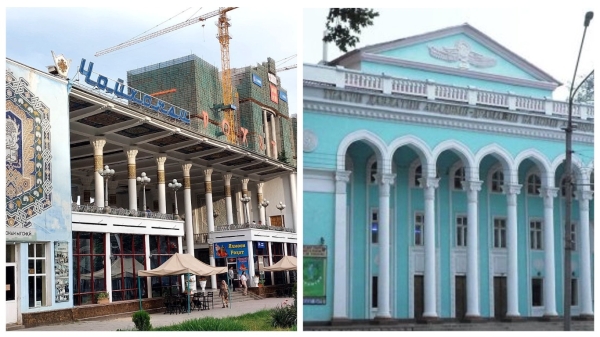
Rohat Teahouse and Tajik Academic Drama Theater named after A. Lohuti will be demolished in the near the future, Nizom Mirzozoda, the head of the Committee for Architecture and Construction under the Government of Tajikistan, told reporters on July 29.
“These buildings are outdated and do not meet modern requirements, but the brands of Rohat Teahouse and Lohuti will be preserved and new buildings will be built for them,” Mirzozoda noted.
He further noted that “Rohat Teahouse was once famous for its delicious dishes, in particular lagman, but now it's not like that.”
Mirzozoda did not say when the teahouse and the theater buildings will be demolished and where new buildings for them will be constructed. He just noted that modern buildings will be constructed on the sites of the teahouse and the theater.
CNN in February 2017 listed the Rohat Teahouse among eleven of the world’s best teahouses. The ornate Rohat Teahouse in Dushanbe is one of the finest places to lounge and sip tea while enjoying city views, according to CNN.
The open-faced two-tiered dining establishment of the teahouse is not ancient – it went up in Soviet times – but it is designed to mimic something from an earlier period of Tajik history. Many foreign visitors who pass through Dushanbe make a point of sampling the teahouse’s inexpensive fare.
Tajik Academic Drama Theater named after A. Lohuti is the first republican theater, which was opened in October 1929. In 1933, the theater was named after A. Lohuti, a Tajik writer, poet and playwright. In 1939 the theater was awarded the title of academic.
On the stage of the Tajik Academic Drama Theater named after A. Lohuti during the Great Patriotic War, there were performances by the directors of the evacuated Theater of the Red Army from Moscow E. Mittelman, A. Aleksandrin, Kanzel based on the plays "Fuente Ovehun" by Lope de Vega, "Othello", "King Lear ", "Romeo and Juliet", "Two Veronians" by W. Shakespeare, "Woe from Wit" by A. Griboedov, "Robbers" by F. Schiller, "Servant of Two Masters" by K. Goldoni, "Uncle Vanya" by A. Chekhov and many other.
The municipal redevelopment plan of Dushanbe includes the construction of modern buildings. The authorities have moved many historical buildings located in close proximity to the construction site for modern buildings.
Demolition of historical buildings in Dushanbe began in 2016 and the first was the building of the Main Post Office.
The authorities then demolished the Mayakovsky Russian Drama Theater. Recall, the founding of the Tajik Soviet Socialist Republic was declared at the Mayakovsky Theater in 1929.
A string of high-profile demolitions soon followed across Dushanbe. There was the Jomi cinema, which when it was erected in the city’s main square in 1956 was one of only five panoramic cinemas in the Soviet Union.
Then, in March 2017, the city administration building – built in the 1950s in a style that combined classical European and local architecture – was demolished.
The decision to demolish the former presidential palace, which had once been the headquarters of the Tajik Communist Party, was made in February 2020. Built in 1957 to commemorate the 40th anniversary of the October Revolution, the almond-colored neoclassical building was perceived by many to be inextricably linked to the country’s history. This historic building was demolished to make space for a new, Chinese government-funded palace that will be the centerpiece of a new government complex.
Then, the city decided to demolish the Green Theatre, a 1933 building that in the 1940s had hosted theatre troupes evacuated from Leningrad and Moscow during the Nazi invasion; the building was demolished in September 2020.
This year, the authorities has demolished the Vakhsh Hotel in downtown Dushanbe.
Plans to demolish some of the most popular landmarks in Dushanbe have sparked outrage and city residents have repeatedly signed petitions addressed to the president and Dushanbe mayor.




